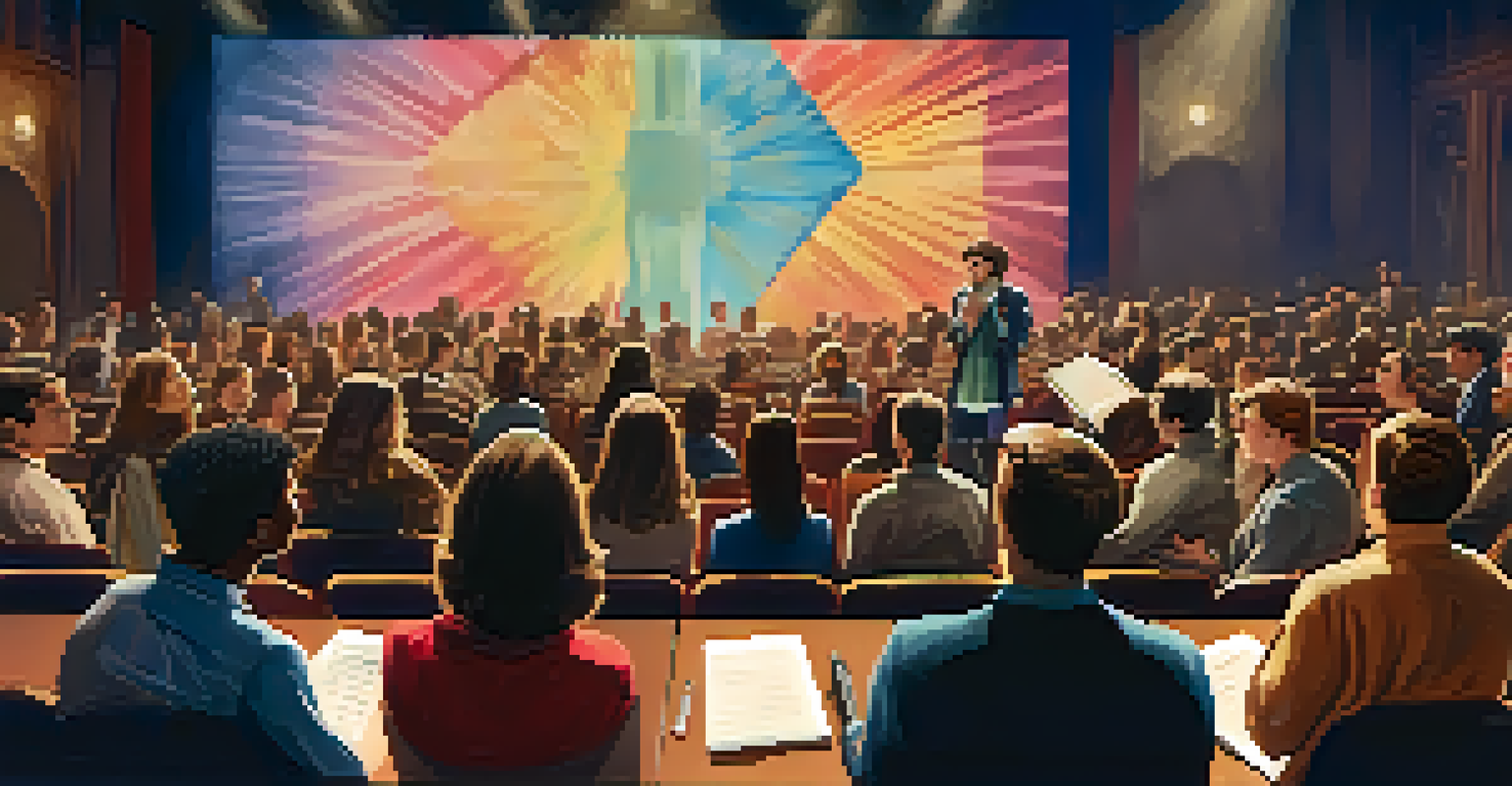Understanding the Essential Role of Casting Directors in Film

What Does a Casting Director Do in Film Production?
Casting directors play a pivotal role in film production by selecting the right actors for each role. They analyze scripts, understand character requirements, and create a vision for the cast that aligns with the director's goals. Essentially, they are the bridge between the creative vision and the talent pool, ensuring that each character comes to life authentically.
Casting is the soul of the film. It's the first step in creating a character and bringing the story to life.
Their responsibilities extend beyond simple auditions; they often conduct extensive searches for talent, considering not just established actors but also newcomers who might bring fresh energy to a role. This ensures a diverse range of performances that can elevate the film's overall quality. Additionally, casting directors must be adept at recognizing actors' potential to portray a character convincingly.
Furthermore, casting directors are also responsible for managing relationships with agents and talent agencies. This requires strong negotiation skills and an understanding of the industry dynamics, as they must balance the needs of the production with the aspirations of the actors. In this way, casting directors shape not just the cast but the very essence of the film.
The Importance of Casting in Storytelling
Casting is not just about finding talented actors; it's about crafting the story itself. The right actor can bring depth and nuance to a character, transforming the screenplay into a compelling narrative. For example, think about how Robert Downey Jr. redefined the character of Iron Man; his unique interpretation added layers that enriched the entire Marvel Cinematic Universe.

Moreover, casting influences audience perception and emotional connection to the film. When audiences see a familiar face or a rising star, their expectations and excitement can shift dramatically. This is why casting directors must be keenly aware of public sentiment and trends within the industry, as these factors can significantly impact a film's success.
Casting Directors Shape Films
Casting directors play a crucial role in selecting actors that align with the film's creative vision, significantly influencing its narrative and emotional depth.
In essence, casting is a crucial storytelling tool. Just as a painter chooses colors to evoke emotions, casting directors select actors to convey the story’s heart and soul. This intricate process highlights how vital their role is in shaping a film's narrative journey.
The Audition Process: Finding the Right Fit
The audition process is a central aspect of a casting director's job, acting as a vital gateway for aspiring actors. During auditions, casting directors assess not only the talent but also how well an actor embodies a character. They often conduct several rounds of auditions, giving actors the chance to showcase their range and suitability for specific roles.
The best performances come from actors who are cast in roles that fit them perfectly.
This process can be both exhilarating and nerve-wracking for actors. Many casting directors utilize callbacks to see how actors interact with each other, which is crucial for ensemble casts. It’s not just about individual talent; the chemistry between actors can significantly influence the film's dynamics and overall performance.
Ultimately, the audition process is a collaborative atmosphere where creativity flourishes. Casting directors encourage actors to bring their unique interpretations to the table, fostering an environment where the best performances can shine. This collaborative effort is essential in identifying the perfect fit for each character.
The Collaborative Nature of Casting
Casting directors work closely with directors, producers, and other key team members to ensure a cohesive vision for the film. This collaboration begins early in pre-production, where casting directors share insights on the types of actors that may best fit certain roles. Their input is invaluable in shaping the film's overall tone and direction.
Additionally, casting directors often attend production meetings to discuss casting choices and receive feedback. This ongoing dialogue helps them stay aligned with the film's creative vision and allows them to make informed decisions about casting. Such collaboration is crucial in ensuring that everyone is on the same page, especially in larger productions with multiple stakeholders.
Casting Directors Shape Film Narratives
Casting directors are pivotal in selecting the right actors, ensuring that characters come to life and align with the director's vision.
Moreover, casting directors also play a significant role in the post-casting phase. Once the cast is finalized, they help coordinate schedules and logistics for rehearsals and filming. This comprehensive involvement showcases how casting directors are not just talent scouts but integral members of the filmmaking team.
Navigating Challenges in Casting
The casting process is not without its challenges. From tight deadlines to budget constraints, casting directors often face multiple hurdles while trying to find the perfect actors. These challenges can add pressure, but experienced casting directors have developed strategies to navigate them effectively.
For instance, they may need to make quick decisions about actors who can fit specific roles, sometimes even at the last minute. This requires a deep understanding of the talent pool and an ability to think on their feet. When unexpected changes occur, such as an actor dropping out, a casting director must swiftly pivot to find suitable replacements.
Despite these challenges, skilled casting directors remain calm under pressure and focused on their goal. Their ability to adapt and problem-solve can significantly influence the overall production timeline and quality. In this way, the resilience of casting directors is as crucial as the talent they select.
The Evolution of Casting in the Digital Age
In recent years, the rise of digital platforms has transformed the casting landscape significantly. Online casting calls and self-taped auditions have become commonplace, allowing casting directors to reach a broader range of talent than ever before. This shift has opened doors for many actors who may not have had access to traditional audition processes.
Moreover, social media plays a crucial role in this evolution. Casting directors often scout talent through platforms like Instagram and TikTok, where emerging actors showcase their skills and creativity. This has created a more competitive environment, as actors can now build their personal brands and gain visibility on a global scale.
Collaboration is Key in Casting
Effective casting directors work closely with directors and producers throughout the filmmaking process to maintain a cohesive vision.
However, this digital transformation also brings new challenges. The sheer volume of submissions can be overwhelming, requiring casting directors to be more efficient in their selection processes. Nevertheless, embracing technology has enabled casting directors to enhance their ability to discover fresh talent while adapting to the ever-changing industry landscape.
Conclusion: The Lasting Impact of Casting Directors
In conclusion, casting directors are essential architects of the film industry, shaping narratives and elevating performances. Their expertise and vision not only impact the casting choices but also influence the overall success of a film. As the industry continues to evolve, the role of casting directors remains pivotal in connecting stories with the right talent.
Their ability to understand character requirements and scout diverse talent ensures that films resonate with audiences on multiple levels. Whether reviving a classic character or introducing new faces, casting directors bring a unique artistry to the filmmaking process that is often overlooked.

Ultimately, the contributions of casting directors extend far beyond mere selection. They are storytellers in their own right, crafting memorable cinematic experiences that leave a lasting impression on viewers. As we continue to enjoy films, let’s appreciate the vital role casting directors play in bringing these stories to life.